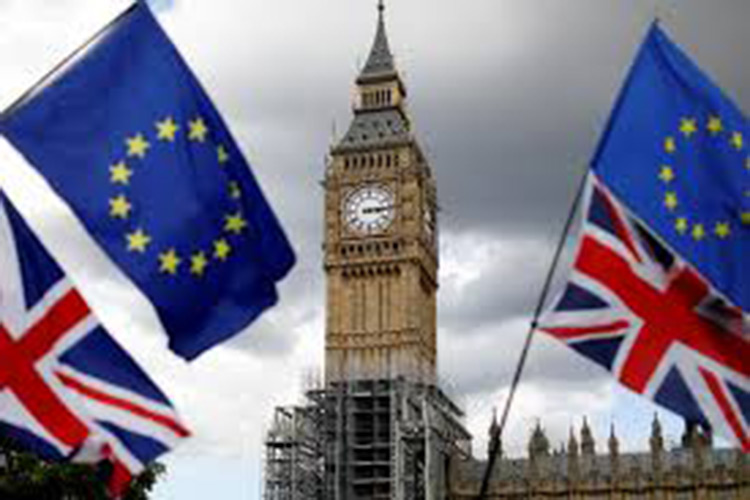
Protesters wave British and EU flags in London. Reuters
By John Rentoul
It says something about the unknowability of history that, this late in the day, the nation is poised between two such different paths. In the past few weeks I have alternated between thinking Theresa May is likely to get her Brexit deal through parliament and that we will never leave the EU.
This weekend I think the most likely outcome is that we will stay. I had thought the prime minister unlikely to win the vote on her deal on Tuesday, and nothing happened this week to change that assessment.
Geoffrey Cox, the attorney general, returned from Brussels empty handed, and May travelled all the way to Grimsby to say nothing new, except to plead with EU leaders to help her. The prime minister may travel to Brussels. There will be a legally binding document of some kind. There may even be a completely coincidental announcement that extra spending on schools and hospitals in Northern Ireland will continue after the expiry of the Conservative Party’s two-year deal with the DUP in June.
The DUP may decide at the last moment to support the deal. But even then the prime minister needs another 106 MPs who voted against the deal last time to change sides. That means, for example, 73 Conservatives and 33 Labour. Those are what nowadays are called “challenging” targets.
Theresa May is paying the price for saying different things to different audiences. In Grimsby on Friday she was still trying to scare Labour MPs into voting for her deal by saying it was better than a no-deal Brexit. In the next sentence, she was trying to scare Tory MPs by saying the alternative to her deal was that “we delay Brexit and carry on arguing about it, both amongst ourselves and with the EU”.
Naturally, Labour MPs hear the message intended for Tories, and vice versa. Labour MPs think, “Why should we vote for the deal when we could delay Brexit, possibly for ever?” And Tory MPs think, “No-deal Brexit is what my local association wants.”
Not only is May’s two-faced message counter-productive, however, it is wrong. She has already in effect ruled out leaving the EU without an agreement. Some of the no-deal Brexiteers have been slow to appreciate the significance of her statement on 26 February. She promised a vote in the Commons and said: “So the UK will only leave without a deal on 29 March if there is explicit consent in this house for that outcome.”
Such consent could not conceivably be forthcoming: there is a large majority in the House of Commons against a no-deal Brexit. This majority would prevail even if May were to split her cabinet and government by trying to whip her MPs to vote for a no-deal Brexit, which she will not.
If, therefore, the Brexit deal is defeated on Tuesday, the Commons will vote against a no-deal exit on Wednesday and will then move on to a third vote, on the question of whether the prime minister should ask the EU27 for more time. It is possible that MPs might vote against all three options, but there are only two capable of gaining a majority. Even if it takes repeated votes, parliament will have to decide either to leave with the deal or to delay Brexit.
If MPs vote for delay, Theresa May has undertaken to act on it. I think the EU27 would agree to extend the deadline, although we cannot be sure for how long or on what terms. If we never leave the EU, that is how it will happen. After Brexit has been delayed once, parliament will face essentially the same choice two, three, nine or 21 months later. Once we have delayed long enough, a new referendum will be a possibility.
The Independent